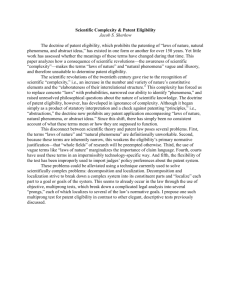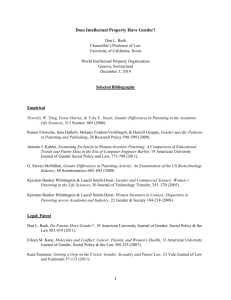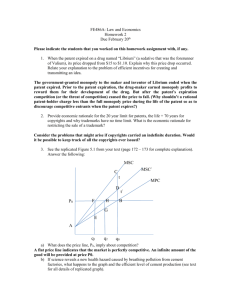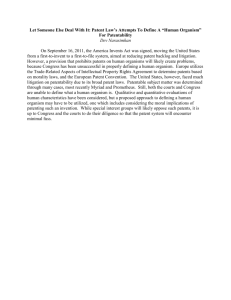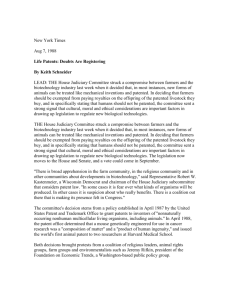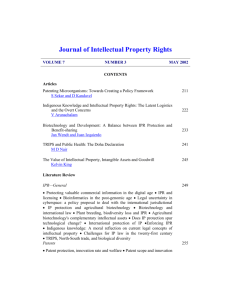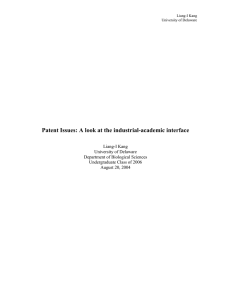Is Nature Just a Form of Private Property
advertisement
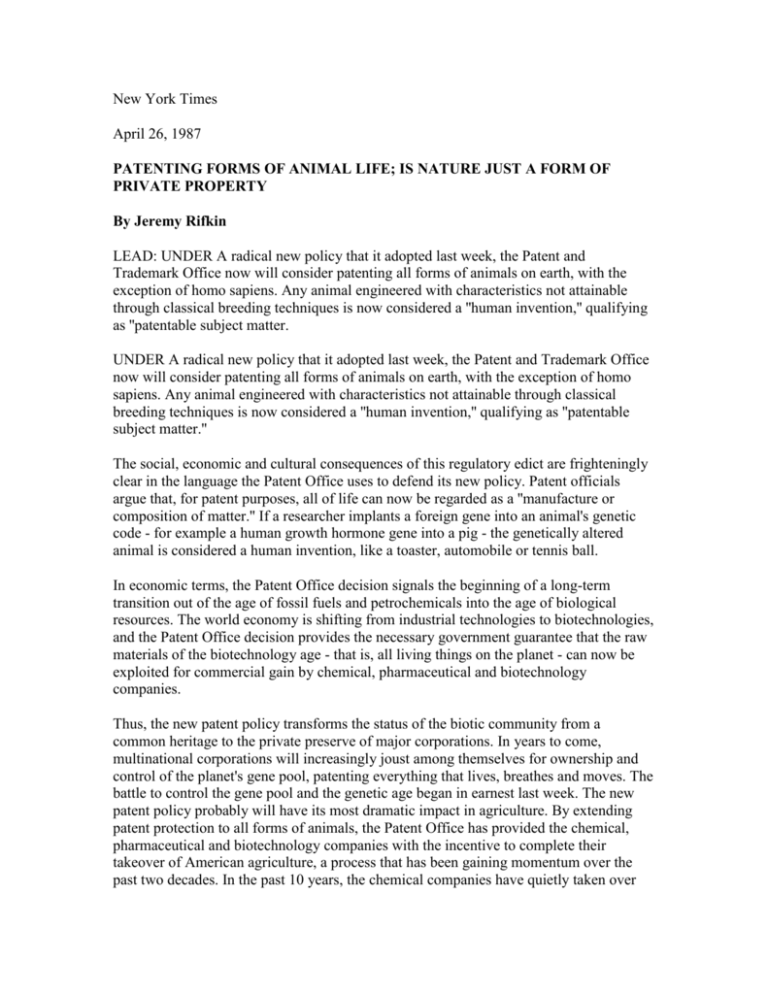
New York Times April 26, 1987 PATENTING FORMS OF ANIMAL LIFE; IS NATURE JUST A FORM OF PRIVATE PROPERTY By Jeremy Rifkin LEAD: UNDER A radical new policy that it adopted last week, the Patent and Trademark Office now will consider patenting all forms of animals on earth, with the exception of homo sapiens. Any animal engineered with characteristics not attainable through classical breeding techniques is now considered a ''human invention,'' qualifying as ''patentable subject matter. UNDER A radical new policy that it adopted last week, the Patent and Trademark Office now will consider patenting all forms of animals on earth, with the exception of homo sapiens. Any animal engineered with characteristics not attainable through classical breeding techniques is now considered a ''human invention,'' qualifying as ''patentable subject matter.'' The social, economic and cultural consequences of this regulatory edict are frighteningly clear in the language the Patent Office uses to defend its new policy. Patent officials argue that, for patent purposes, all of life can now be regarded as a ''manufacture or composition of matter.'' If a researcher implants a foreign gene into an animal's genetic code - for example a human growth hormone gene into a pig - the genetically altered animal is considered a human invention, like a toaster, automobile or tennis ball. In economic terms, the Patent Office decision signals the beginning of a long-term transition out of the age of fossil fuels and petrochemicals into the age of biological resources. The world economy is shifting from industrial technologies to biotechnologies, and the Patent Office decision provides the necessary government guarantee that the raw materials of the biotechnology age - that is, all living things on the planet - can now be exploited for commercial gain by chemical, pharmaceutical and biotechnology companies. Thus, the new patent policy transforms the status of the biotic community from a common heritage to the private preserve of major corporations. In years to come, multinational corporations will increasingly joust among themselves for ownership and control of the planet's gene pool, patenting everything that lives, breathes and moves. The battle to control the gene pool and the genetic age began in earnest last week. The new patent policy probably will have its most dramatic impact in agriculture. By extending patent protection to all forms of animals, the Patent Office has provided the chemical, pharmaceutical and biotechnology companies with the incentive to complete their takeover of American agriculture, a process that has been gaining momentum over the past two decades. In the past 10 years, the chemical companies have quietly taken over the world's seed companies, guaranteeing them a lock on the domesticated plants of the planet. Now, they are in position to take over animal husbandry. For hog farmers, dairymen, sheep ranchers and cattlemen, this week's decision is likely to touch off a bitter struggle with the big corporations, with the survival of the family farm hanging in the balance. Will farmers be forced to buy patented animals from the multinational corporations in the years ahead? Will they have to pay a royalty for every piglet and calf they birth? Will they have to make special arrangements with the corporations every time they want to sell part of their herd? A NEW and insidious form of tenant farming looms on the horizon. This time around, however, the new farmers of the Genetic Age will be leasing their plants and animals as well as their land. The shock with which last week's decision was received shows that the policy has touched a raw nerve. Patenting all forms of life! For many of us, this decision is a harbinger of a brave new future where pigs and primates, dogs and cats, birds and beasts are suddenly reclassified, stripped of their species integrity, robbed of their special biological bonds and reduced to the level of chemical compositions. The specter of the new policy is haunting, indeed, mindboggling. A handful of non-elected bureaucrats in a Government agency, sealed off and isolated from public participation, have taken it upon themselves to reduce all living things to the new lowly status of ''manufactured processes.'' Even human genetic traits are now patentable, according to the new ruling. Any number of human genes can now be transferred to other animals. These engineered animals, with human genes functioning in their genetic code, can then be patented. Of course, patent officials were quick to point out this week that, for now, constitutional safeguards prevent homo sapiens from becoming patentable subject matter. The genetic engineering revolution has been growing exponentially for over a decade, and as it has, two issues have surfaced repeatedly: One, the need to facilitate rapid commercial exploitation of genetically engineered processes and products, and two, the ethical and social considerations in engineering and redesigning the genetic code. Now, these two issues are joined in direct and open confrontation. Is all life to be redefined as a manufactured process subject to patenting and ownership by private companies? Or are living things to be spared this ultimate form of technological reductionism? The resolution of these issues will affect generations to come, establishing the context for how our children's children will define life. Will future generations come to perceive life as mere chemicals, manufactured processes or inventions of no greater value than industrial products? Or will we act to respect life, by resisting the ultimate temptation to turn living things into pure utility? Ultimately, the patenting question will be decided by Congress. Will our elected officials meekly accept the edict handed down by the Patent Office? Or will ethical concerns override commercial pressures, leading Congress to prohibit the patenting of animals? The American public will be watching carefully to see how they respond to this historic issue.
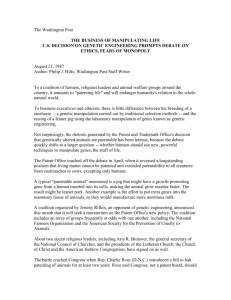
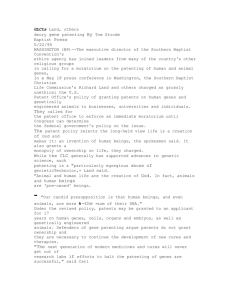
![Introduction [max 1 pg]](http://s3.studylib.net/store/data/007168054_1-d63441680c3a2b0b41ae7f89ed2aefb8-300x300.png)
